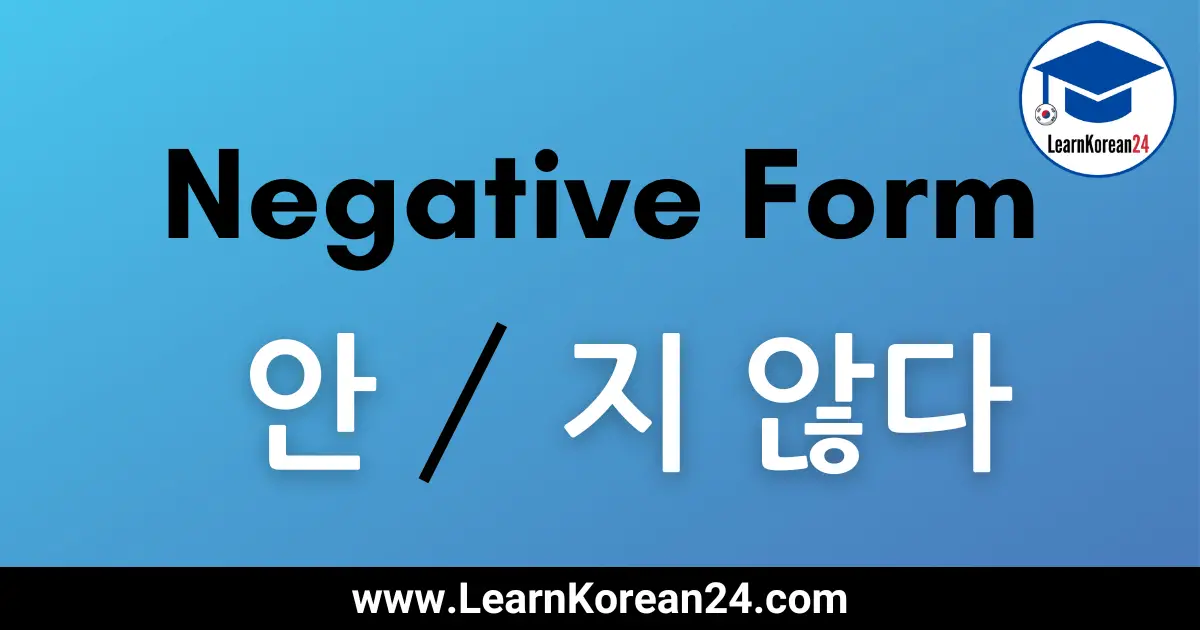How To Make Negative Sentences in Korean
Once you know how to make Korean sentences, making negative sentences in Korean is quite easy. In this lesson, you will learn how to make negative sentences in Korean using the negative adverb 안 and the ending 지 않다.
Negative Sentences In Korean
Broadly speaking, there are two main ways to make a negative sentence in Korean. One is using 안 before a verb, and the other is using ~지 않다 at the end of a verb. Below we will cover how to make negative sentences using 안 and ~지 않다, and review other ways to make negative sentences, such as ‘can’t‘ (-(으)ㄹ 수 없다) and ‘to not exist/not have‘ (~없다) that were covered in previous lessons.
Negative Sentences In Korean With 안
The easiest and most common way to make a negative sentence in Korean is to simply add 안 in front of the verb. Let’s look at some examples.
먹다 = to eat
안 먹다 = to not eat
아침 안 먹어요. = I am not eating breakfast. / I do not eat breakfast. (present tense/present progressive)
아침 안 먹었어요. = I did not eat breakfast. (past tense)
아침 안 먹을 거 예요. = I will not eat breakfast. (future tense)
Exceptions
하다 Verbs
The way to make negative sentences with ‘하다’ verbs is slightly different. 하다 verbs are made up of a noun + 하다. For example, 공부하다 (to study) 청소하다 (to clean), etc. To make the negative form with these verbs you must add 안 after the noun and before 하다. Let’s look at an example.
공부해요 = study
공부 안 해요. = I am not studying. I don’t study.
있다 / 없다 / 알다 / 모르다
Other exceptions are the words 있다 (to exist) and 알다 (to know). To make the negative form with these verbs, rather than add 안, you instead use the antonym (opposite word). Let’s look at some examples.
알다 = to know
모르다 = to not know
그 사람 알아요? = Do you know that person?
아니요. 그 사람 몰라요. = No. I don’t know that person
있다 = to exist/to have
없다 = to not exist/to not have
돈이 있어요? = Do you have money?
아니요. 돈이 없어요. = No. I don’t have any money.
할 수 있다 = can
할 수 없다 = can’t
운전할 수 있어요? = Can you drive?
아니요. 운전할 수 없어요. = No. I can’t drive.
Negative Sentences In Korean With ~지 않다
~지 않다 is a negative verb ending and so to make a negative sentence with ~지 않다 you must first attach ~지 않다 to the verb/adjective stem and then conjugate ~지 않다 into the appropriate tense. Let’s look at some examples.
아침을 먹었어요? = Did you eat breakfast?
아니요. 먹지 않았어요. = No, I didn’t eat breakfast.
주말에 친구 만나요? = Are you going to meet your friends at the weekend?
아니요. 만나지 않아요. = No, I am not.
Compared with 안, making negative sentences with ~지 않다 sounds a little more formal and is often used for emphasis.
Negative Questions In Korean
Once you know how to make negative sentences in Korean, making negative questions is really easy. You simply add a question mark at the end of the sentence if you’re writing, or raise your intonation at the end of the sentence if you’re speaking. Easy right?
A potentially confusing thing about negative questions in Korean is how to answer them. This was covered in a previous lesson on ‘Yes’ and ‘No’ in Korean. Just in case you don’t remember, here’s a recap on why answering negative questions in Korean can be confusing.
In English if someone asks you a negative question such as “You don’t like kimchi?” and you answer “No.” it means that you do not like kimchi. However, in Korean, if someone asks the same question “김치 안 좋아해요?” and you answer no (아니요) it means that you like kimchi.
This is because in Korean, yes(네) and no (아니요) express your agreement or disagreement with what someone is saying. So in the above example, when asked 김치 안 좋아해요? (You don’t like kimchi?) by answering 아니요 (no) it means ‘No, i disagree. I do like kimchi.’
Example Korea Negative Sentences
Let’s review. Here are some example sentences using the negative form in Korean.
토요일에 회사에 가요?
= Are you going to the office on Saturday?
아니요, 안 가요.
= No. I am not going.
오늘 운동했어요?
= Did you exercise today?
아니요, 운동 안 했어요.
= No. I didn’t exercise.
지금 비가 와요?
= Is it raining now?
아니요, 비가 오지 않아요.
= No. It’s not raining.
술 안 마셔요?
= Aren’t you going to drink alcohol?
네, 술 안 마셔요.
= No, I’m not going to drink alcohol.
Thanks for reading. I hope you found this guide useful and you can now form the negative in Korean.
STUDY ONLINE WITH KOREAN ARAH!
Ready to take your Korean to the next level?
Get One-on-One Korean lessons from a qualified and experienced Korean language tutor!

